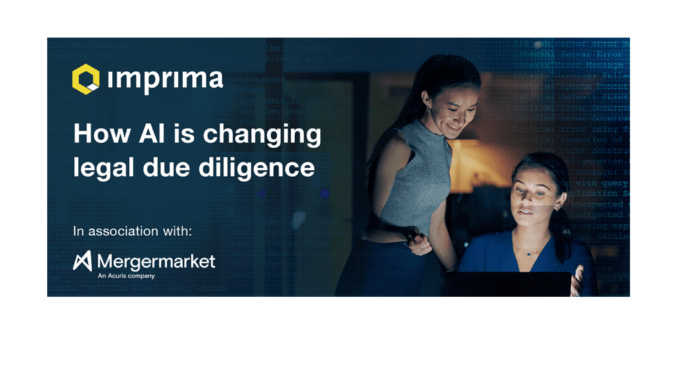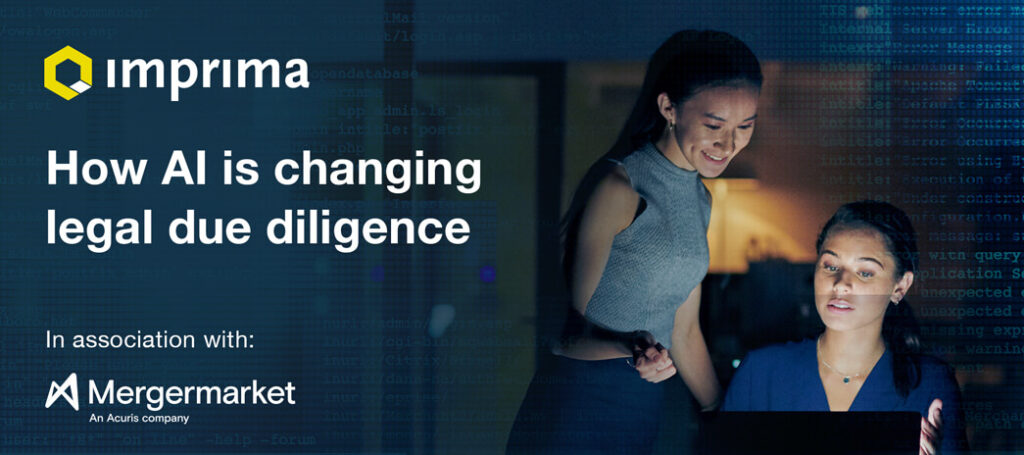
Introduction to an expert panel discussion on ‘How AI is changing legal due diligence’, by Imprima.
In this panel discussion five legal and technology experts share their day-to-day experiences of using AI in due diligence and consider how that might develop in the future:
- Helen Bradley – Head of Corporate Finance & London and Global Chair of Capital Markets Practice Group, Baker McKenzie
- Emma Danks – Head of PE & Co-Head of Global Corporate/M&A Group, Taylor Wessing
- Dr. Pierre G. Zickert – Manager Legal Technology & Senior Associate, Hengeler Mueller
- Stacey Rickford – Strategic Operations Director, Travers Smith
- Pieter van der Made – Executive Chairman, Imprima
Below is an excerpt from the discussion, you can read the full version here. This is the latest collaboration between Mergermarket and the high-tech due diligence solutions provider, Imprima.
—
- Mergermarket: What processes in legal due diligence can already be improved or automated by AI?
Emma Danks, Taylor Wessing: First, AI can enable us to scope the projects out. For example, if we have a data room full of documents and those documents relate to a target group which has subsidiaries in many jurisdictions, we can use an AI tool to help us to scope out what we’re going to need to do, including which local counsel we will need to involve depending on the governing law of the documents to be reviewed.
But secondly, AI tools are very well-suited to assisting the review of documents or contracts which are quite commoditised. Leases are an obvious example. Supply agreements are another, where often a business will have one standard form that it rolls out multiple times, so as part of our review, we’re just looking for something which might slightly vary from that. So that’s where AI is incredibly useful because it can identify variations to a standard contract more efficiently than a team of lawyers, allowing the lawyers to focus on analysing the consequences of those variations.
[Read the full article, openly available to all – ‘How AI is changing legal due diligence.’]
Helen Bradley, Baker McKenzie: I think you have to really understand what AI can and cannot do for you. And you need to be clear about that with your clients. At the minute, AI can do a very sophisticated extraction or identification of data, but then someone has got to review it. From our experience, it is reliable.
It’s not perfect, and probably similar quality to a human review. So, there are huge efficiencies in identifying the relevant information, but then someone is going to have to take all of that data and do something with it. You couldn’t present the extracted data ‘as is’ to a client, but it does save us time on a big contract review – it can save 50% of the time typically taken for the initial review.
Pierre G. Zickert, Hengeler Mueller: Just to add, artificial intelligence is somehow overrated and underrated in both ways. One might say AI was at least overhyped at the beginning.
Some say, this is not true. It is only overrated if you are under the impression that it can completely automate due diligence. AI allows you to perform the legal work without the pain of doing all the paperwork, to see and structure the information and to get to where you can actually work with your legal mind. And this
is the point one usually underrates. Without having to filter, sort and structure the data first, one can perform high-end legal work from the start. This is a huge advantage and a huge change to how hours were spent in the past.
Pieter van der Made, Imprima: AI is able to automate a number of tasks and present information to the lawyers in a much more efficient way – processes such as document categorisation, finding agreements that contain certain clauses, and finding clauses in those agreements. It is indeed true that the last task needs human oversight – trained lawyers still need to review the information. The latter is not a problem as we do not assume that any lawyer will blindly rely on AI anyway.
- Mergermarket: What are the biggest challenges to increasing adoption of AI tools in the legal sector? Which conditions have to be met for implementation of AI at law firms?
Pieter van der Made, Imprima: Up until this point, one of the main challenges has been the precondition that law firms had to invest significant internal resources to label a large amount documents in order to train the algorithms before being able to use the AI. Clearly, this will hamper the speed of widespread adoption, because law firms simply don’t have the time to do that. At same time, law firms do not necessarily want to rely on the training that has been done by the vendors of the AI technology either, because they have their own standards as to how documents should be reviewed. Another issue is that once trained, the AI is language and jurisdictionally dependent because it is trained on a certain set of agreements – from a certain jurisdiction and/or in a certain language.
Therefore, we have designed our AI tools at Imprima such that they do not require any pre-training. Instead the AI learns from lawyers’ behaviour while they do their normal review work. As a result, law firms can benefit from significantly improved accuracy as well as large time savings without upfront time investment.
- Mergermarket: How do your clients, the corporates or PEs, in M&A processes, feel about the use of AI in due diligence processes? Is there enthusiasm for these new technologies or scepticism?
Helen Bradley, Baker McKenzie: I think it has been embraced by all of our clients. The problem is that there has been a lot of hype, and clients sometimes have unrealistic expectations. But at the end of the day, once we explain to the client what the technology can and cannot do, they understand.
But overall, law firms have got to be using it these days, not just because clients demand it but also to hire and retain high-quality talent. Junior lawyers don’t want to spend all day and night in data rooms carrying out largely non-legal tasks.
We want our juniors to be doing what junior lawyers should be doing, not administrative tasks like sorting data. So, for the sake of our junior employee’s career development, bringing in AI and other technological tools is the way to go.
[Read the full article, openly available to all – ‘How AI is changing legal due diligence.’]

[ Artificial Lawyer is proud to bring you this sponsored thought leadership article by Imprima. ]